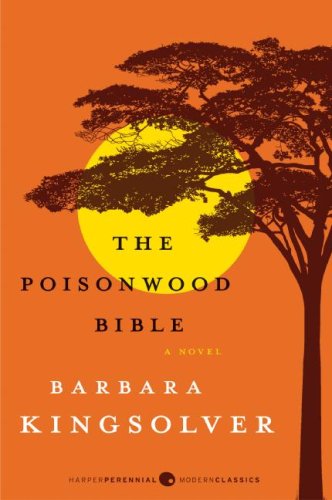
Barbara Kingsolver’s compelling story of one family’s experience of deprivation, longing, and tragedy is made all the more intriguing by its unique narrative style. The story, told by Orleanna Price and her four daughters, reveals an unyielding Baptist minister, Nathan Price, who takes his family on a mission to the Congo in 1959.
Each narrator provides her own perspective on the family’s Congo experience. Orleanna tells her story in retrospect, looking back at what she lost and what she learned. Rachel, the eldest daughter, thinks about things—about loss and what she misses from home. The twins, Adah and Leah, are as dissimilar as can be. Adah, disfigured by hemiplegia at birth (a condition that affected her left side and her ability to speak), can talk but chooses not to, though her lack of speech doesn’t impede her sharp observations. Leah feels guilty about taking nourishment from her twin in the womb, believing that she caused Adah’s affliction. Leah also adores her father and desperately wants his approval. She watches helplessly as he becomes ever frustrated in his ability to manage the native people’s faith, environment, or even, it seems, his own family. Meanwhile, the baby, Ruth May, shielded by her mother and her innocence, cannot be entirely protected in a situation over which none of them—not even Nathan—have any control.
It’s interesting that the narration is told entirely by the females in the Price family, since they have no voice under Nathan’s roof. Adah tells of the conditions surrounding her birth: “My parents seem to have taken this well in stride. I am sure the Reverend explained to his exhausted wife that it was the will of God, who could plainly see—with these two additional girls so close after the first one—our house had enough females in it now to fill it up with blabber.”
Shirking his duties as husband and father, Nathan fervently clutches onto his self-proclaimed image as divine messenger of God while throwing his family into a situation that tests them not only spiritually but also physically. They barely survive the enormous environmental changes, yet all of them (except Nathan) grow and evolve beyond their conditions.
Nathan, on the other hand, never changes. He tries to force his views on the Congolese, refusing to recognize that he is the foreigner. He romanticizes baptizing the villagers in the river, ignorant that it is infested by crocodiles. Nathan proclaims, “Jesus is bangala!” Adah says, “But the way he pronounces it, it means the poisonwood tree. Praise the Lord, hallelujah, my friends! For Jesus will make you itch like nobody’s business.”
Nathan is predictable; the story is not. The tragedy that Orleanna alludes to from the beginning is only one of many surprises in store for the reader. Brilliantly written, The Poisonwood Bible invites in-depth analysis. It’s the kind of tale that your thoughts will return to again and again.


